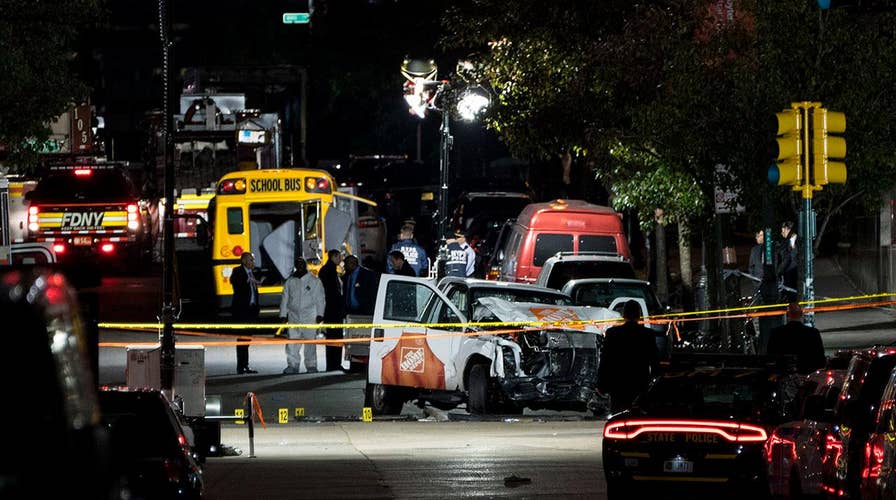You might be surprised to discover that the average college freshman doesn’t remember 9/11.
I was even more surprised to find that a lot of Congressmen don’t either.
That’s the only good explanation for their willingness to play chicken with one of our most valuable anti-terrorism programs. Section 702 of the Foreign Intelligence Surveillance Act will lapse at the end of the year. And that has inspired a group of Congressmen from the extreme left and extreme right to say that they will let it die if they don’t get what they want. Unfortunately, what they want is to repeal history – and the lessons we all learned on 9/11.
Section 702 allows the government to intercept communications of foreigners who are located overseas. Only foreigners can be targeted for surveillance, but if a foreign terrorist is trading emails with an American, both sides of those conversations will be collected -- the American’s as well as the foreign target’s. No one is arguing that such intercepts shouldn’t happen; if foreign terrorists (or other intelligence targets) are talking to Americans, we need to know who they’re talking to and what they’re saying.
What has the left-right coalition upset is that the intercepted emails are stored in a database that can be checked for other names to help investigators find other terrorist connections. That means, they say, that the communications of Americans (at least the ones who’ve been writing to foreign terrorists) could be searched without a warrant. So they want government investigators to get a separate warrant every time they go back to that lawfully collected database and type in the name of an American.
That sounds like a constitutional requirement, but it’s not. The courts have reviewed the program, and none have held that the Constitution requires a belt for collecting evidence and separate suspenders for searching the same evidence after it’s been collected. Nor is it a response to intentional abuses. The program gets vigorous oversight from Congressional committees, FISA judges, the Justice Department, and privacy and civil liberties officers inside the executive branch; none has found intentional abuses.
I never again want to stand before the children and parents of Americans killed by terrorists and say that my enthusiasm for some unproven theory of civil liberties helped get their loved ones killed.
Instead, the motive of the proposal is ideological, and the risk it addresses is entirely hypothetical. Maybe someday, its supporters say, the government will be tempted to engage in abusive searches, and requiring a warrant will make that less likely.
Unfortunately, the costs of the proposal are anything but hypothetical. It would raise new barriers to the information-sharing and dot-connecting that we’ve rightly insisted upon after learning the lessons of 9/11. Today, when an FBI counterterrorism analyst gets a tip about a suspicious actor, the analyst can run the suspect’s name and number through many databases, including the one holding 702 intercepts.
If the suspect has been communicating with known terrorists abroad, the FBI will get a hit from the 702 database – while there’s still time to stop an attack. Under the new proposal, the 702 database could be locked behind a wall built of probable cause , courts, warrants, and a set of chilling reporting requirements. By the time the FBI gets over this new wall, it could be too late.
That’s exactly the wrong response in today’s climate. Inspired by ISIS, more terrorists are internet-radicalized loners, and many are already known in a general way to law enforcement. They may be “lone wolves” but they’re also “known wolves.” This is no time to make it harder to do an electronic background check on these known suspects. If there were a truth in labeling requirement for acts of Congress, the proposed warrant requirement would be called the “Known Lone Wolf Preservation Act.”
This is all achingly familiar to me. In the 1990s, I was one of those who defended the idea of a wall between intelligence and law enforcement. Not because there had been actual abuses, but because it was easy to imagine them. So why not construct a wall and reduce the risk of abuse?
Well, now we know. In August of 2001, just weeks before the 9/11 attacks, it was the wall that prevented the FBI’s largest and most sophisticated counterterrorism task force from acting when it got word that hardened al Qaeda terror plotters were inside the United States. The FBI had plenty of time in late August and early September to track the plotters down; if they had been allowed to use the intelligence, I am convinced that they would have caught the terrorists and changed history. But the FISA court and FBI lawyers were enforcing the wall so harshly that in the end the FBI task force was forced to stand down, and the attacks played out.
When the 9/11 Commission held its hearings, I felt compelled to tell that story – and to recant my support for the wall.
“I was wrong,” I testified.
I never again want to stand before the children and parents of Americans killed by terrorists and say that my enthusiasm for some unproven theory of civil liberties helped get their loved ones killed.
And if I can offer one piece of hard-earned advice to members of Congress, it’s this: Neither do you.

